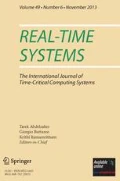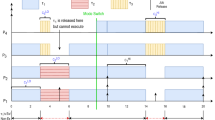Abstract
This paper first studies the problem of scheduling hard real-time sporadic gang task systems under global earliest-deadline-first on a multiprocessor platform, where a gang application’s threads need to be concurrently scheduled on distinct processors. A novel approach combining new lag-based reasoning and executing/non-executing gang interval analysis technique is introduced, which is able to characterize the parallelism-induced idleness, as a key challenge of analyzing gang task schedules. To the best of our knowledge, this approach yields the first utilization-based test for hard real-time gang task systems. To further handle the clustered scheduling scenario, we propose a partitioning scheme that enables a set of gang tasks to be efficiently assigned and scheduled among multiple clusters.







Similar content being viewed by others
Notes
Under the density test, an implicit-deadline sporadic task system is schedulable under GEDF if \(U_{sum} \le M - (M-1) \cdot u_{max}\) holds, where \(u_{max}\) denotes the maximum task utilization in the system.
Note that we assume that \(M \ge \max _{1 \le i \le n}\{m_i\}\). Otherwise, some tasks cannot be executed due to the insufficient number of processors.
In this paper, we only consider gang tasks with implicit deadlines.
References
Adhianto L, Banerjee S, Fagan M, Krentel M, Marin G, Mellor-Crummey J, Tallent NR (2010) Hpctoolkit: tools for performance analysis of optimized parallel programs. Concurr Comput 22(6):685–701
Baker TP (2003) Multiprocessor edf and deadline monotonic schedulability analysis. In: Real-time systems symposium. IEEE, pp 120–129
Baruah S (2007) Techniques for multiprocessor global schedulability analysis. In: RTSS, pp 119–128
Berten V, Courbin P, Goossens J (2011) Gang fixed priority scheduling of periodic moldable real-time tasks. In: 5th junior researcher workshop on real-time computing, pp 9–12
Bertogna M (xxxx) Evaluation of existing schedulability tests for global edf. In: ICPPW’09
Bertogna M, Baruah S (2011) Tests for global edf schedulability analysis. J Syst Archit 57(5):487–497
Bonifaci V, Marchetti-Spaccamela A, Stiller S, Wiese A (2013) Feasibility analysis in the sporadic dag task model. In: 25th Euromicro conference on real-time systems
Collette S, Cucu L, Goossens J (2008) Integrating job parallelism in real-time scheduling theory. Inf Process Lett 106(5):180–187
Courbin P, Lupu I, Goossens J (2013) Scheduling of hard real-time multi-phase multi-thread (mpmt) periodic tasks’. Real-Time Syst 49(2):239–266
Dagum L, Menon R (1998) Openmp: an industry standard api for shared-memory programming. IEEE Comput Sci Eng 5(1):46–55
Devi UC, Anderson JH (2005) Tardiness bounds under global edf scheduling on a multiprocessor. In: RTSS, pp 12–24
Dong Z, Liu C (2016) Closing the loop for the selective conversion approach: a utilization-based test for hard real-time suspending task systems. In: 2016 IEEE on real-time systems symposium (RTSS). IEEE, pp 339–350
Dong Z, Liu C, Gatherer A, McFearin L, Yan P, Anderson JH (2017) Optimal dataflow scheduling on a heterogeneous multiprocessor with reduced response time bounds. In: Proceedings of 29th Euromicro conference on real-time systems (ECRTS 2017)
Feitelson DG (1996) Packing schemes for gang scheduling. In: Workshop on job scheduling strategies for parallel processing. Springer, pp 89–110
Feitelson DG, Rudolph L (1992) Gang scheduling performance benefits for fine-grain synchronization. J Parallel Distrib Comput 16(4):306–318
Goossens J, Richard P (2016) Optimal scheduling of periodic gang tasks. Leibniz Trans Embed Syst 3(1):04-1
Goossens J, Funk S, Baruah S (2003) Priority-driven scheduling of periodic task systems on multiprocessors. Real-Time Syst 25(2–3):187–205
Goossens J, Berten V (2010) Gang ftp scheduling of periodic and parallel rigid real-time tasks. arXiv:1006.2617
Jette MA (1997) Performance characteristics of gang scheduling in multiprogrammed environments. In: Proceedings of the ACM/IEEE conference on supercomputing, SC, 15–21 Nov 1997, San Jose, CA, USA, p 54. https://doi.org/10.1145/509593.509647
Kato S, Ishikawa Y (2009) Gang edf scheduling of parallel task systems. In: Real-time systems symposium, 2009, RTSS 2009. 30th IEEE. IEEE, pp 459–468
Lakshmanan K, Kato S, Rajkumar R (2010) Scheduling parallel real-time tasks on multi-core processors. In: 2010 IEEE 31st real-time systems symposium (RTSS). IEEE, pp 259–268
Leontyev H (2010) Compositional analysis techniques for multiprocessor soft real-time scheduling, Ph.D. dissertation, University of North Carolina at Chapel Hill
Li J, Agrawal K, Lu C, Gill C (2013) Outstanding paper award: analysis of global edf for parallel tasks. In: 25th Euromicro conference on real-time systems
Liu C (2013) Efficient design, analysis, and implementation of complex multiprocessor real-time systems, Ph.D. dissertation, Citeseer
Liu C, Anderson JH (2012) An o (m) analysis technique for supporting real-time self-suspending task systems. In: RTSS, pp 373–382
Manimaran G, Murthy CSR, Ramamritham K (1998) A new approach for scheduling of parallelizable tasks in real-time multiprocessor systems’. Real-Time Syst 15(1):39–60
Nelissen G, Berten V, Goossens J, Milojevic D (2012) Techniques optimizing the number of processors to schedule multi-threaded tasks. In: 2012 24th Euromicro conference on real-time systems (ECRTS). IEEE, pp 321–330
Ousterhout JK et al (1982) Scheduling techniques for concurrent systems. In: ICDCS, vol 82, pp 22–30
Pacheco PS (1997) Parallel programming with MPI. Morgan Kaufmann, San Francisco
Papazachos ZC, Karatza HD (2011) Gang scheduling in multi-core clusters implementing migrations. Fut Gener Comput Syst 27(8):1153–1165
Richard P, Goossens J, Kato S (2017) Comments on gang edf schedulability analysis. arXiv:1705.05798
Ryu KD, Pachapurkar N, Fong LL (2004) Adaptive memory paging for efficient gang scheduling of parallel applications. In: Parallel and distributed processing symposium, 2004. Proceedings. 18th International. IEEE, p 30
Saifullah A, Li J, Agrawal K, Lu C, Gill C (2013) Multi-core real-time scheduling for generalized parallel task models. Real-Time Syst 49(4):404–435
Singh S (2012) Performance optimization in gang scheduling in cloud computing. Int Organ Sci Res 2(4):49–52
Szeliski R (2010) Computer vision: algorithms and applications. Springer, New York
Tesla speculation: how many nvidia drive px2 gpus are needed for level 5 autonomy? http://teslaspeculation.com/2017/07/03/how-many-nvidia-drive-px2-gpus-are-needed-for-level-5-autonomy/
Zhou BB, Brent RP (2001) Gang scheduling with a queue for large jobs. In: Parallel and distributed processing symposium, Proceedings 15th international. IEEE
Author information
Authors and Affiliations
Corresponding author
Additional information
Publisher's Note
Springer Nature remains neutral with regard to jurisdictional claims in published maps and institutional affiliations.
Work supported by NSF Grants CNS 1527727 and CNS CAREER 1750263.
Rights and permissions
About this article
Cite this article
Dong, Z., Liu, C. Analysis techniques for supporting hard real-time sporadic gang task systems. Real-Time Syst 55, 641–666 (2019). https://doi.org/10.1007/s11241-018-9318-7
Published:
Issue Date:
DOI: https://doi.org/10.1007/s11241-018-9318-7




